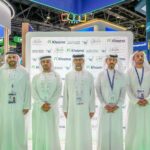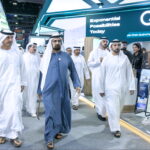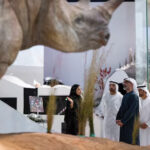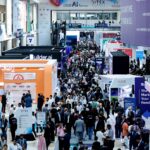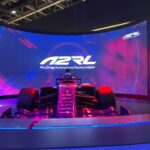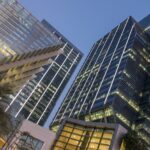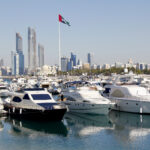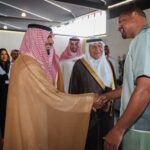G42’s Khazna harnesses renewable energy to power Mideast data centers
Khazna CEO Hassan Alnaqbi says working with Microsoft, OpenAI and Nvidia means access to latest technology, dividends for UAE economy
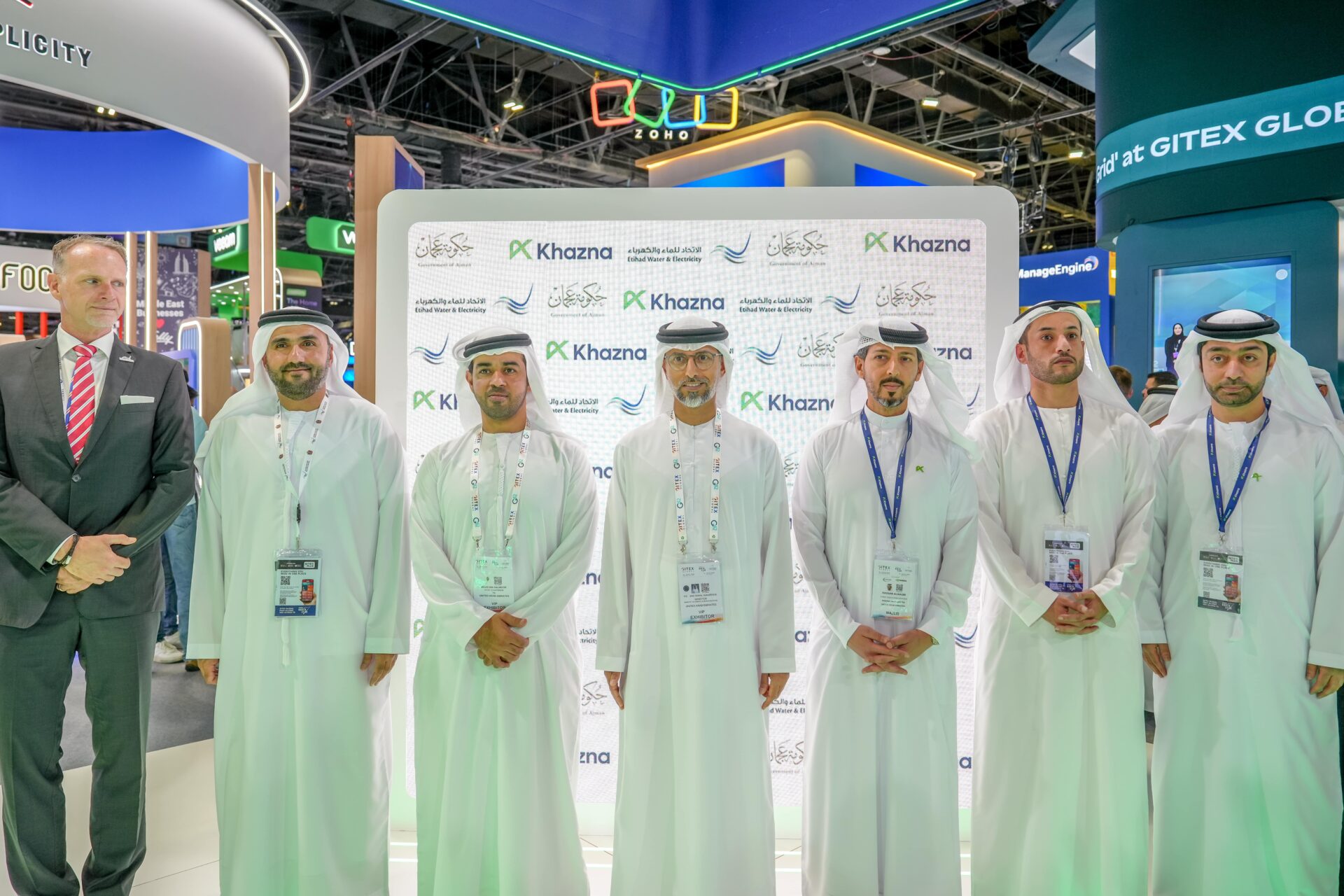
Khazna CEO Hassan Alnaqbi at GITEX press conference on Tuesday to the right of UAE Energy and Infrastructure Minister Suhail Al Mazroui at center (Photo: Khazna)
Hassan Alnaqbi, the CEO of Abu Dhabi-based Khazna, is trying to solve the riddle of satisfying the enormous energy appetite for artificial intelligence development without sacrificing the company’s commitment to phasing out fossil fuels.
Alnaqbi, who heads the UAE’s largest operator of computer data centers – a subsidiary of the sovereign wealth-backed AI firm G42 – announced at the GITEX Global conference on Tuesday that Khazna will soon open its most sophisticated facility yet.
The new 100-megawatt data center, located east of Dubai in the emirate of Ajman, will showcase Khazna’s latest technological advances in supporting AI development and serve as a model for future operations in the UAE and abroad. A central selling point in Khazna’s expansion plans will be its ability to align the data center’s power needs with climate goals.
“Clients are now demanding a sustainability roadmap from any organization they work with,” Alnaqbi said in an interview with The Circuit. “This has become a criterion for partnering with any player in the market.”
Alnaqbi, who has led Khazna for 10 years after its 2012 founding by the Mubadala sovereign wealth fund, has been in the inner circle this year as G42 has signed deals with Microsoft, Nvidia and OpenAI, all of which are dependent on his data centers.
The interview has been edited for length and clarity.
What trends do you see shaping the data center industry in the Middle East and its importance to the development of AI technologies?
The trend is AI, a buzzword that has been in the market for some time. However, sustainability is becoming increasingly important. Energy also has become a key pillar for the growth of this business, especially with the demand AI brings in terms of energy. If you look at where global demand for AI is heading in the next 10 years, it’s fascinating. We are talking about at least 10 to 13x the demand of what we have today in terms of gigawatt so that all brings challenges to technology and to using energy.
What are the biggest challenges facing the data center industry in the Middle East at the moment?
Today, the data center, and the system you put to build it, needs more energy. We have seen the UAE has spearheaded this by announcing the net zero target by 2050, so for us, it’s not really enough as an industry. We need to help the government with their target. As an industry, energy becomes really important, especially with AI coming in. So energy is, by far, the biggest challenge at the global scale.
So how do you handle the energy challenge?
To handle it, you need to partner with the global players and you need to partner with the government authority. As Khazna, we are spearheading investment in sustainable energy. We have undertaken some investment alongside players like Emerge, where they help us build sustainable energy so we can get clean power into the facility. We have about 7.5 megawatt of solar plants that we have invested in alongside global players like Masdar and Emerge to bring more clean power into the facility. There are a lot of investments happening at the government level when it comes to solar plants and nuclear, so we are partnering with some in the government to help accessing these resources as well,
What strategies are Khazna implementing to achieve carbon reduction targets given AI’s massive energy needs?
If you look at the overall life cycle of data center design, building and operation, we have been trying to tackle this issue from the get-go. It started with where we could find the land and how we find the power sources that are within close proximity to the land. So we worked with the government to understand what is the portfolio of sources of power that they have around that particular land. Once we get that, then we start with the design. Within the design, we make sure that all the materials we select are sustainable materials. We select the system, the cooling and diesel generators, etc. that are actually more sustainable. We started with water cooling systems and then we moved into air cooling systems in the past two years, and now we are more into adiabatic cooling systems where we use water more efficiently.
We have a zero-waste policy, meaning everything generated as waste is taken by certified suppliers, not to landfills, but to factories that convert it into energy. We collaborate with partners and the industry to support this strategy and aim for more sustainable projects in the future.
Are there opportunities in all of this?
Yes, definitely. I mean the opportunities are there. For example, we are now working on a project in Kenya. We have access through our partnership to do thermal plants within Kenya and that is a more sustainable source of power than in any market. So we went there to actually try to use this opportunity to attract foreign investments into a market such as Kenya.
Can you tell me about Khazna’s origin story and spinout from G42 and Etisalat?
Khazna was established in 2012, it was majority-owned by Mubadala Investment Co. During 2012, they began to see that there was no key player in the market that could provide critical infrastructure in the form of a data center. I joined in 2014 before the start of the operation. So I was lucky to actually lead the company to where it is today. The intention was the market was trying to evolve into becoming more of a digital market, with all the initiatives that were made by the government in terms of the smart government and the blockchain and later on, the adoption of cloud technology. All of that made the business make even more sense. Mubadala heavily invested in this to try to create an ecosystem within the country.
We started with two data centers – one in Abu Dhabi and one in Dubai. In these two data centers we managed to attract the local players and the likes of telcos and the likes of large enterprises and some government and semi-government. We started evolving in 2017 when we began changing our design and trying to adapt our design to become more cloud-ready. Then itself we began landing some of the hyperscalers who invested in the technology to actually offer cloud computing as a service. It was the growth trajectory for us.
2020 in particular is when G42 acquired Khazna from Mubadala, and then we became 100% owned by G42 at that time. G42 was also in the process of building their own data center, so that integration allowed us to take ownership of all their future data center requirements and put it under Khazna’s umbrella because we are the data center experts that came into the group.
In 2021, G42 and (UAE telecom company) Etisalat decided that it is also time for Etisalat to integrate their data center business under one umbrella. That was to create a powerhouse within the country that not only provides state of art facilities but also exports this technology in different jurisdictions. So that’s how these two businesses merged their data center businesses under Khazna. Today G42 owns 60% of Khazna and Etisalat owns the remaining 40%.
Given that you are owned by G42, what’s your relationship with Microsoft, Open AI, Nvidia and other top international firms?
We work with all the global players. What’s happening with these global partnerships is that companies have access to international expertise and talents, in addition to advanced technology. There is a lot of knowledge sharing, and they have access to standards and practices that come within these partnerships, and that helps companies improve efficiency, but also helps improve innovation. So that’s one angle to it, but also having these global partnerships is beneficial for the country in general. It attracts foreign investment in the country and therefore boosts the local economy. With that, there will be a lot of job creation. There will be a lot of talent attraction into the market and that benefits everyone including Khazna of course.
What sort of future opportunities does working with such tech giants help Khazna?
Aligning with these big tech companies and aligning our international practices and procedures has helped us access new markets. Of course, when these companies come and invest in the region, they need partners to help them unlock some of the local markets within the region. Khazna is actually at the forefront of that, and we are aligning our international practices procedures and standards to meet the demand and help basically reducing their risk for the cross-border operation.
In terms of market share, at least within the UAE as a market, we have the majority share. On a regional level, that is the Middle East, Africa, Turkey and India, we are probably the biggest data center player in the entire market in terms of capacity. I can confidently say we are one of the largest infrastructure players in the entire market. That is because we started early in this journey.
What is Khazna’s position in the Middle East data center market?
In terms of market share, at least within the UAE as a market, we have the majority share. On a regional level, that is the Middle East, Africa, Turkey and India, we are probably the biggest data center player in the entire market in terms of capacity. I can confidently say we are one of the largest infrastructure players in the entire market. That is because we started early in this journey.


